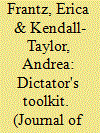|
|
|
Sort Order |
|
|
|
Items / Page
|
|
|
|
|
|
|
| Srl | Item |
| 1 |
ID:
186377


|
|
|
|
|
| Summary/Abstract |
The Biden administration came into office seeking to create a stable and predictable relationship with Russia. Determined to devote more time and attention to China, Washington sought to reduce tensions with Putin’s Russia in order to avoid confrontation that might derail the administration’s agenda. Yet despite Washington’s approach, relations with Russia have turned out to be anything but stable and predictable. On February 24, 2022, Vladimir Putin launched a full-scale invasion of Ukraine. Putin's war of choice catalyzed a massive shift in international perceptions of Putin and a series of responses—ranging from punishing sanctions on Russia’s financial sector to private sector steps to curtail business operations inside the country—that have fundamentally altered relations with Russia. It is now impossible to imagine that there could be any substantive improvement in US-Russia relations while Putin remains in power.
|
|
|
|
|
|
|
|
|
|
|
|
|
|
|
|
| 2 |
ID:
132348


|
|
|
|
|
| Publication |
2014.
|
| Summary/Abstract |
A dictator's motivation for using repression is fairly clear, but why some repress more than others or favor particular types of repressive strategies is less obvious. Using statistical analysis, this article demonstrates that a dictator's reliance on co-optation fundamentally alters how repression is used. Specifically, it finds that co-optation through the use of political parties and a legislature creates incentives that lead dictators to decrease empowerment rights restrictions, like censorship, while increasing physical integrity rights violations, like torture and political imprisonment. This occurs because, by creating parties and a legislature, a dictator draws his potential opposition out of the general public and into state institutions, making it easier to identify who these opponents are, to monitor their activities, and to gauge the extent of their popular support. This reduces the need to impose broad types of repressive measures, like empowerment rights restrictions, that breed discontent within the overall population. At the same time, co-optation creates the risk that rivals, once co-opted, will use their positions within the system to build their own bases of support from which to seek the dictator's overthrow, generating incentives for dictators to increase physical integrity violations to limit the threat posed by these individuals.
|
|
|
|
|
|
|
|
|
|
|
|
|
|
|
|
| 3 |
ID:
176444


|
|
|
| 4 |
ID:
156956


|
|
|
|
|
| Summary/Abstract |
Globalisation, shifting power dynamics and the growing availability of the internet and other communication technologies have significantly changed the environment in which autocrats operate. Some observers have concluded from these changes that citizens now hold the upper hand, and that dictators’ days are numbered.1 The centralisation of power, according to this argument, is a requisite of dictatorship. In a world in which power is diffusing across NGOs, corporations, and wealthy and technology-empowered individuals, dictators will soon find themselves unable to build and maintain the power needed to uphold their repressive systems of rule.
|
|
|
|
|
|
|
|
|
|
|
|
|
|
|
|
| 5 |
ID:
136631


|
|
|
|
|
| Summary/Abstract |
Democracy has suffered eight straight years of global decline. This was the finding Freedom House issued in its 2014 report examining the state of global political rights and civil liberties.1 This downward slide in political freedom has been the longest continuous decline in political rights and civil liberties since the watch-dog organization began measuring these trends over 40 years ago.
Some of this backsliding has occurred in democratic countries like Hungary, where Prime Minister Viktor Orban publicly declared the end of liberal democracy as he continued to undermine the media, the judiciary, and other key institutional checks on executive power following his election in 2010. Or in Turkey where President Recep Tayyip Erdogan has dismantled checks on his power, censured opponents, and limited critical media, particularly in the last two years. However, a good deal of the deterioration globally has occurred within the subset of states we would consider to be non-democracies. From Egypt to Russia to Venezuela to Thailand, autocratic incumbents are expanding their control over the levers of power.
|
|
|
|
|
|
|
|
|
|
|
|
|
|
|
|
| 6 |
ID:
182262


|
|
|
|
|
| Summary/Abstract |
The Biden administration came into o*ce with a clear and
unambiguous foreign policy priority: countering a rising
China. The administration’s public statements, its early national security planning documents, and its initial diplomatic forays
have all suggested that pushing back against Beijing’s growing global
in+uence will be Washington’s national security focus, alongside
transnational threats such as climate change and the COVID-19 pandemic. The question ofhow to deal with Russia, by contrast, has taken
a back seat, returning to the fore only when Russian troops amassed
on Ukraine’s border in April. That crisis served as a reminder ofthe
danger oflooking past Moscow—yet by July, President Joe Biden was
back to declaring that Russia was “sitting on top ofan economy that
has nuclear weapons and oil wells and nothing else.”
|
|
|
|
|
|
|
|
|
|
|
|
|
|
|
|
| 7 |
ID:
112877


|
|
|
|
|
| Publication |
2012.
|
| Summary/Abstract |
This article examines the link between oil abundance and regime durability by providing insight into how and why oil-rich leaders use elections to maintain power. Using data from presidential elections in Central Asia, the article argues that oil-rich leaders are better able to manipulate their economies in the run-up to elections than their resource-poor counterparts. Oil-rich leaders use oil profits to increase pre-electoral spending to increase popular support, to deter potential opposition and to secure elite loyalty. Such electorally timed increases in spending help oil-rich leaders increase their re-election prospects and ensure their continued control over their countries' resources.
|
|
|
|
|
|
|
|
|
|
|
|
|
|
|
|
|
|
|
|
|